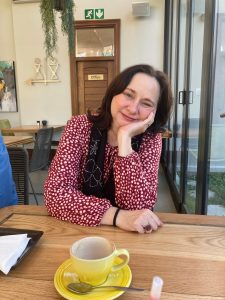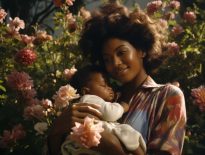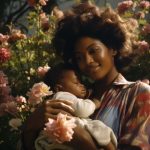When the call from my brother came it was still unexpected.
As always, he started the conversation with an offensive—that’s the nature of our relationship, it’s always been.
“Since the surgery, she’s just been lying in bed,” he says curtly.
“Surgery is traumatic, especially for older people,” I reply. “Maybe rest is not the worst thing…”
“You’re not here. You don’t understand what’s going on!” He cuts me off.
He sighs—the sigh he reserves especially for me, his younger sister by five years. The sigh which signifies the nature of our relationship. The sigh which is meant to convey his irritation at my ineptness and ignorance. I’ve learned not to take the bait.
“Why did you call?” I ask.
I know what he’s going to say. I’ve known for a while. I’ve seen the signs earlier this year when I visited Mom.
“Her doctor says she’s showing early signs of Dementia.” It still comes as a shock, to hear it being said out loud.
Images of my beautiful, intelligent, and fiercely independent mother flood through my mind. At 76 she was still living alone in the house she bought with my dad in the seventies.
When Dad passed on twenty years ago, she refused to leave despite our urgings to scale down, and maybe move closer to me and my family.
“I enjoy my freedom,” she would say. “I want to do my own thing, live my life the way I choose. Besides, I don’t want to be a burden to my children.”
Motherhood Through my Kaleidoscope – A Creative Nonfiction by Makia Lucy, Kenya
My brother’s irritated voice draws me back to the present. “She’s in total denial about it,” he says.
It must be a really frightening thing to hear. I think to myself, but I don’t say it. He wouldn’t want to hear it.
“She refuses to eat and sleeps all day. She’s clearly in a depression bout.”
He’s scared. I understand. I feel it too. It’s terrifying, to say the least—this new reality we’re faced with. Our mother, the one person we could always rely on, who is always there for us is not going to be that person anymore. From now on we’re going to have to be there for her.
He won’t ever admit it, but he knows she’s the only person who will ever love him unconditionally, who’ll forgive him unconditionally. That’s what mothers do.
Motherhood Through Different Lens – A Creative Nonfiction by Kimumwe Douglas, Uganda
He waits for me to respond. I muster every bit of courage I can find, swallowing back the tears pricking behind my eyes. I dare not show him my pain. I have to be strong for him like she has always been.
“It’s time for Mom to come live with us,” I say quietly. It’s not what he wanted to hear. It’s too soon, but there’s nothing else to say. “We’ll have to sell the house…” I add. His icy silence is discouraging, but I plow ahead. “You’re away for three months of the year. I can’t fly out to come take care of her every time you go away,” I try to explain, doubting that he’ll understand how difficult it is for a mother to leave her child.
I only really understood that bond when I held my own son for the first time. It was only once I had looked into his eyes—the same color as mine, as hers—that I could comprehend what my mother tried to explain to me when I asked her why she loved my brother more than me.
The question disarmed her. “Why would you think that?” she asked.
“You are my children, both of you. I can never love one more than the other.”
“But you do Mom. He’s your favorite,” I said.
I could see the hurt in her eyes, but I had to know. She thought a moment, weighing her words.
“A mother may love her children in different ways, but it’s always in equal measure,” she replied earnestly. “Your brother is my son, my first-born. That’s special, but you are my daughter, my youngest. That’s a different kind of special. Do you understand?”
I didn’t, not really.
**
She watches quietly how the men working for the removal company swiftly load the few pieces of furniture and other earthly possessions we would be able to accommodate in our house, 1200km away from where she lived for more than forty years. Her watery blue eyes uncomprehending.
My heart breaks as I watch this woman—my mother—who used to be a presence larger than life, a formidable force in this world, now reduced to a tiny childlike figure with hunched shoulders bent low over a walking frame and trying desperately to understand why her home, her life is now just an empty space.
I put my arms around her frail shoulders, the bone tangible underneath the thin wrinkled skin. “It’s going to be okay Mom,” I try to comfort her. She looks at me, for a moment lost as to who I am. Then recognition, the familiar smile I know and love.
“The potted geraniums would look nice in your garden,” she says as she glances over the garden that used to be immaculate, but now shows clear signs of neglect. I nod, burying my sadness under a brave facade for her sake.
Jaded – A Creative Nonfiction by Alex Tamei, Kenya
“I’ll take the pot with us in the car. We can put it on the windowsill in Mom’s room,” I say.
I can see the thought makes her happy. Then she slips away again. She looks at me, once again disoriented. “Where are they taking my things?” she asks anxiously. I comfort her like a mother would a frightened child.
“No need to worry. They’re taking all your things to my house. You’re coming to live with us now,” I reply.
She looks around the empty rooms. “Okay,” she says, her shoulders hunched in resignation, “Whatever you think is best.”
She forgets about the frame she’s become so dependent on since her hip surgery. She scuffles out the door. I take her hand and walk her slowly to the car like I used to do with my son when he was just starting to walk.
She doesn’t look back, just stares out in front of her, lost in that happy place where this terrible illness takes her.
I look around at the house one last time—the home where my brother and I spent most of our childhood years.
A memory floods into my mind. I’m a child of about five, playing under the big oak tree in the front yard. My mom’s immersed in a book in one of the garden chairs. I trip and fall, hurting my knee. I cry. She rushes over, kisses my knee, and wipes my tears, then takes my hand and gently pulls me up. “You’re going to be okay,” she says with a comforting smile.
She supports me as I hop into the house on one leg. I cling to her hand. I know I’m safe. My mom’s here. She’ll take care of it, all of it. She always does…
 Louise Venter considers herself a logophile and word alchemist who tells stories, fictional or not. As a freelance journalist and television scriptwriter, she considers it a privilege to be able to make a living from her love for words, but it was only recently that she rediscovered the joy of writing her own stories.
Louise Venter considers herself a logophile and word alchemist who tells stories, fictional or not. As a freelance journalist and television scriptwriter, she considers it a privilege to be able to make a living from her love for words, but it was only recently that she rediscovered the joy of writing her own stories.
Born in Namibia, the country she would always call home even though she spent only the first ten years of her life there before her family moved to South Africa, Louise was often found in her favourite tree daydreaming about fairies or reading a book.
When her elderly mother had to come and live with her and her family and Louise had to pack from her parents’ home, she found amongst her belated father’s scrapbooks, a file filled with several of her earliest attempts at writing short stories and poems – a childhood pastime she inevitably neglected later in life.
When her contract writing for the popular South African television soap Sewende Laan came to an end when the series concluded in 2023, Louise decided to take an unofficial sabbatical from her freelance work and finally started putting words to paper for the multitude of stories that she wants to tell, the first of which was Motherhood, a deeply personal semi-biographical narrative.
When Louise is not writing she reads or crafts, but mostly she loves being out in Nature hiking or swimming with her husband and son. They live in a rural town in South Africa with her mother and a menagerie of animals. Louise is often seen writing in her favourite local coffee shop where she drinks too many cappuccinos and spends many happy hours observing people and listening to their stories. She is passionate about animal welfare and finds her volunteer work with Klein Karoo Connect, an NPO that aims to improve the lives of local people in her community, a source of much joy.







